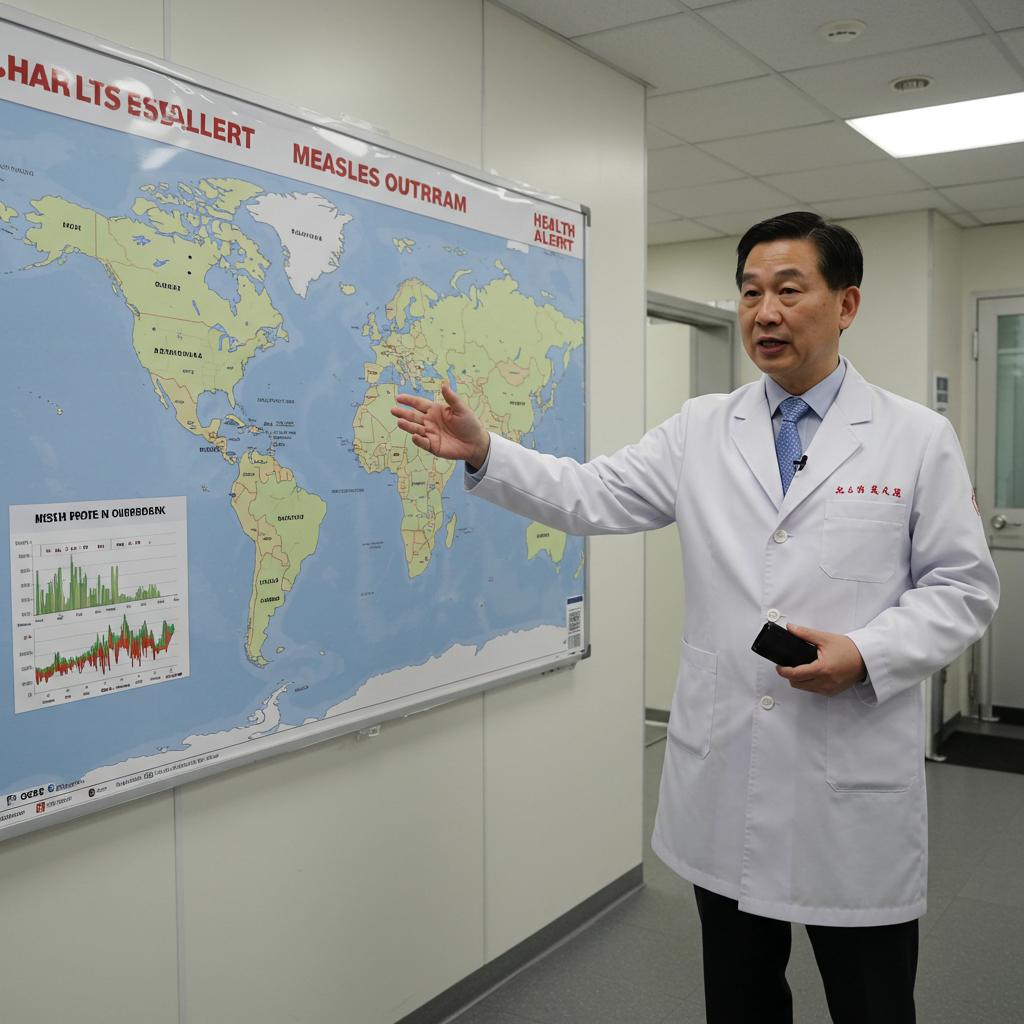measles is unfortunately making headlines again, with concerning outbreaks impacting communities across the United States and internationally. For travelers, this resurgence raises valid questions and concerns, particularly during busy travel seasons when crowded spaces are common. Understanding the risks and knowing the right protective steps is absolutely essential to keeping yourself and your loved ones safe on your journey.
Recent data for 2025 shows a significant rise in measles cases in the U.S., already surpassing the total number reported throughout all of 2024. Major outbreaks have been identified, notably concentrated in Texas and New Mexico, contributing to the majority of reported infections nationwide. While robust public health systems in the U.S. help contain wider spread, the virus is highly contagious and poses a real threat, especially to those who are unprotected. Travel, whether domestic or international, acts as a conduit, allowing the virus to move between populations and spark new outbreaks.
Understanding Measles: A Highly Contagious Threat
Measles is far more contagious than many common illnesses. Imagine this: if ten unvaccinated individuals are exposed to the measles virus, roughly nine of them will become infected. This incredibly high “attack rate” is one reason why outbreaks can spread so rapidly, particularly in settings where people are close together, like airports, airplanes, cruise ships, or busy tourist destinations.
The virus spreads primarily through respiratory droplets released when an infected person coughs or sneezes. What makes it particularly challenging to contain is its ability to linger. The measles virus can remain infectious in the air and on surfaces within a room for up to two hours after an infected person has left. You don’t need direct, prolonged contact to catch it.
Adding to the stealthy nature of measles, infected individuals become contagious before the characteristic rash even appears. They can spread the virus for about four days before the rash begins and continue to spread it for another four days after. During the initial contagious period, symptoms might be vague, like a runny nose or cough, easily mistaken for a common cold or allergy. This means someone can unknowingly transmit measles while traveling before they or anyone else suspects they have the illness.
Symptoms, Complications, and Vulnerability
Measles symptoms typically begin with a high fever, often exceeding 104°F. This is usually followed by a cough, runny nose (coryza), and red, watery eyes (conjunctivitis). The hallmark measles rash appears three to five days after initial symptoms. It usually starts as flat red spots around the hairline and on the face before spreading downwards over the neck, trunk, arms, and legs. The spots may merge together as they spread.
While often considered a childhood illness, measles can lead to serious complications at any age. However, young children under five and individuals with weakened immune systems face the highest risk of severe outcomes. Potential complications are unpredictable and can include ear infections, pneumonia (a common cause of measles-related death), and encephalitis (inflammation of the brain). Rarely, a devastating and fatal brain disease called subacute sclerosing panencephalitis (SSPE) can occur years after a measles infection, even after apparent recovery. These risks underscore the critical importance of prevention.
Your Best Defense: The MMR Vaccine
Fortunately, there is a highly effective and safe way to protect against measles: the Measles, Mumps, and Rubella (MMR) vaccine. This vaccine provides robust, long-lasting protection against all known strains of the measles virus.
The standard recommendation from health authorities like the CDC and the American Academy of Pediatrics (AAP) is a two-dose series for children. The first dose is typically administered between 12 and 15 months of age, and the second dose between four and six years of age.
Vaccine effectiveness is exceptionally high with the recommended two doses. One dose of the MMR vaccine provides approximately 93% protection against measles. Receiving the second dose boosts this protection to about 97%. For most individuals who receive two doses according to the standard schedule, protection is considered lifelong.
While rare, “breakthrough” cases of measles can occur in fully vaccinated individuals. However, symptoms in these cases are typically much milder, and the risk of transmitting the virus to others is significantly reduced compared to unvaccinated individuals. vaccination not only protects the vaccinated person but also plays a crucial role in preventing the spread to vulnerable populations who cannot be vaccinated, such as infants too young for the vaccine or those undergoing certain medical treatments like chemotherapy.
Vaccination Guidance for Travelers
Ensuring you and your family are fully vaccinated against measles is the single most important step before traveling, especially to destinations experiencing outbreaks or with generally lower vaccination rates.
Children and Infants
Follow the standard two-dose schedule for children aged 4 and older. For younger children, ensure the first dose is given between 12 and 15 months if possible.
Infants pose a particular challenge as they are too young for the routine MMR vaccine until 12 months. While they receive some passive immunity from their mothers, this protection fades. During outbreaks or before international travel, health authorities recommend an early dose of the MMR vaccine for infants aged 6 to 11 months. This early dose provides some protection, though it is considered less effective than the standard dose given after the first birthday. Importantly, an infant who receives this early dose still needs two more doses according to the standard schedule: one at 12-15 months (or at least 28 days after the early dose) and the second at 4-6 years. The early dose does not count towards the standard two-dose series required for things like school entry.
For infants under 6 months who cannot receive the vaccine, protection relies on “cocooning” and avoiding exposure. Cocooning means ensuring everyone in the infant’s household and all close contacts are fully vaccinated. Avoid taking unvaccinated infants into crowded public spaces, especially where measles transmission is known or suspected.
Adults
Most adults born before 1957 are generally presumed to be protected due to likely natural infection during a time when measles was widespread. However, immunity can vary.
Adults born between 1963 and 1967 may have received a less effective version of the measles vaccine used during that period and might benefit from an updated dose or confirming immunity through a blood test (titer).
For all other adults, ensure you have received two doses of the MMR vaccine. If you are unsure about your vaccination history or immunity status, consult your healthcare provider. They can review your records, recommend vaccination if needed, or perform a blood test to check for immunity.
Timing Your Vaccination
If you or a family member needs vaccination, it’s best to get it at least two weeks before traveling for optimal protection to develop. However, even getting one dose offers significant protection (93%) and is better than traveling unvaccinated.
Navigating Outbreaks and High-Risk Areas
Measles outbreaks are currently ongoing in several U.S. states, with Texas and New Mexico reporting high case numbers in 2025. Europe also experienced its highest number of cases in over 25 years in 2024, and cases continue to rise internationally. Traveling to or from these areas increases your potential exposure risk.
The CDC and other health organizations maintain lists of countries with high measles transmission. Consulting these resources before planning international travel is wise. Even if you received your initial vaccination many years ago, Dr. Stephen Morse, a professor of epidemiology, suggests that for certain high-risk international destinations, a booster dose might be considered alongside other travel vaccinations, although this is typically optional for fully vaccinated individuals. Checking your antibody levels via a lab test is another way to confirm existing immunity if you’re concerned.
Beyond Vaccination: Extra Precautions While Traveling
While vaccination is the cornerstone of protection, other measures can help reduce your risk of exposure, especially in crowded travel settings:
Consider Wearing a Mask: Since measles spreads through airborne droplets, wearing a mask in airports, on planes, trains, buses, and other crowded indoor spaces can provide an extra layer of defense, similar to how masks help prevent the spread of other respiratory illnesses.
Practice Good Hand Hygiene: Frequently wash your hands thoroughly with soap and water or use an alcohol-based hand sanitizer (at least 60% alcohol). Avoid touching your face, eyes, nose, and mouth, especially after touching shared surfaces.
Avoid Contact with Sick Individuals: If you see someone exhibiting symptoms like a rash, fever, or persistent cough, try to maintain distance.
What to Do If You Suspect Measles
Monitor yourself and your family for measles symptoms for three weeks after returning from international travel or visiting a domestic area experiencing an outbreak. Symptoms to watch for include fever, cough, runny nose, red eyes, and especially a rash.
If you develop symptoms consistent with measles, it is crucial to contact your healthcare provider immediately. Call ahead before visiting any clinic, doctor’s office, or hospital. This allows the healthcare facility to take necessary precautions, such as isolating you upon arrival, to prevent potential spread of the highly contagious virus to other patients and staff. Be sure to inform them about your recent travel history and vaccination status.
Frequently Asked Questions
What are the main symptoms of measles, and how contagious is it?
Measles typically starts with a high fever, cough, runny nose, and red, watery eyes. A characteristic rash appears a few days later, usually starting on the face and spreading downwards. Measles is extremely contagious; if ten people without immunity are exposed, about nine will get sick. The virus spreads through the air via coughing and sneezing and can remain infectious in the air or on surfaces for up to two hours. Importantly, individuals are contagious for about four days before the rash appears.
Who needs the MMR vaccine before traveling, including infants and adults?
Health authorities recommend that all* travelers ensure they are up-to-date on their MMR vaccine, whether traveling domestically to outbreak areas or internationally. Children need two doses, usually at 12-15 months and 4-6 years. Infants aged 6-11 months traveling internationally or to outbreak areas should receive an early dose, but still need two standard doses later. Adults born before 1957 are usually immune, but those born 1963-1967 or others with uncertain status should confirm immunity or get vaccinated.
How effective is the MMR vaccine, and do vaccinated people need a booster?
The MMR vaccine is very effective. One dose offers about 93% protection, and two doses provide approximately 97% protection against measles. For most people who receive two doses, protection is considered lifelong. Fully vaccinated individuals typically do not need a booster dose. However, adults born between 1963-1967 may need an updated dose, and some experts suggest considering a booster for travel to extremely high-risk international destinations, though this is optional for those with confirmed immunity.
Stay Informed and Protected
The resurgence of measles is a reminder that vigilance is necessary, particularly in a mobile world. The evidence is clear: vaccination with the MMR vaccine remains the most effective defense against this serious, highly contagious illness. Before your next trip, take a moment to verify your vaccination status and that of your family members. Consult with your healthcare provider to ensure you are adequately protected, especially if you are traveling with infants or have questions about your immunity history. Staying informed and vaccinated is the key to safe and healthy travel.
Word Count Check: 1188


